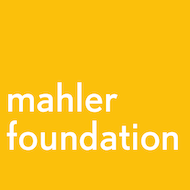Chronology: Year 1910
- Location: Musik-Festhalle
- Nature: Ausstellung Munchen (Munich exhibition)
- Program: Mahler
- Composition Mahler:
- Symphony No. 8 (Premiere)
- Soloist: Emma Bellwidt (1879-1937), Anna Erler-Schnaudt (1878-1963), Gertrude Forstel (1880-1950), Nicola Geisse-Winkel (1872-1932), Richard Mayr (1877-1935), Ottilie Metzger-Lattermann (1878-1943), Felix Senius (1868-1913), Martha Winternitz-Dorda (1880-1958), Erhard M. Heyde (violin)
- Conductor: Gustav Mahler (1860-1911)
- Orchestra: The enlarged orchestra of the Munich “Konzertverein”, concertmeister E. Heyde; a total of 170 players. 8 horns, 4 trumpets, 4 trombones, bass tuba, besides the ‘isolated’ group of 4 trumpets and 4 trombones, harmonium, organ and piano and 5 harps.
- Chorus: Singverein der k.k. Gesellschaft der Musikfreunde in Wien”(250 voices, conductor Franz Schalk (1863-1931); Riedel-Verein choir (250 voices, conductor G. Gohler; the mixed Childrens’ choir from the Munich “Stadtische Zentral-Singschule (350 voices)
- Concert number: c271
- Impresario: Emil Gutmann (1877-1920).
- Sold out.
- Due to start at 7.30, the first members of the audience started to arrive an hour beforehand, and by seven oçlock some thousand were already seated in the hall. Mahler on stage at 7.45 sharp.
- Notes: World premiere. A. Hempel (organ). The general rehearsal took place at 11-09-1910 at 2 p.m. Originally Emma Bellwidt (1879-1937) was scheduled to sing in both concerts (also on 13-09-1910). In a letter from early 09-1910 to the impresario Emil Gutmann (1877-1920) Mahler questioned, for the second time, the competence of Mr. Heyde and suggested Arnold Josef Rose (1863-1946), his brother-in-law would replace him. Emil Gutmann (1877-1920)‘s response is not known, but apparently Mahler did, willfully, invite Arnold Josef Rose (1863-1946) to one of the final rehearsals, but without warning the orchestra in advance; they naturally revolted. Mahler eventually had to be content with Mr. Heyde. Repetition on 1910 Concert Munich 13-09-1910 – Symphony No. 8.
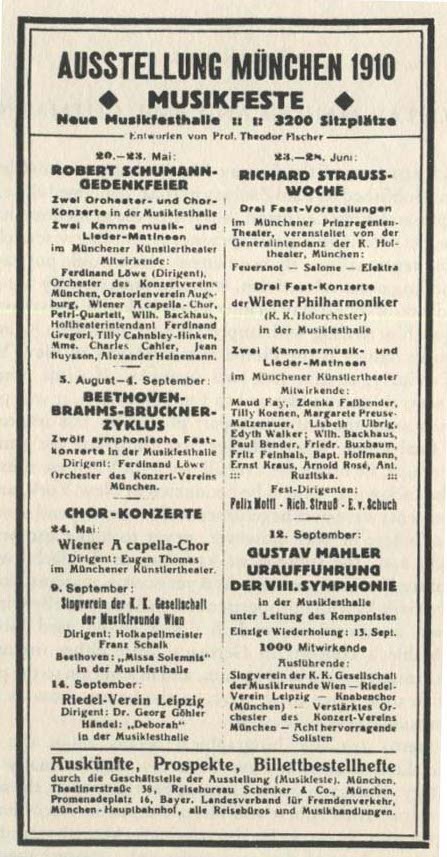
Year 1910. Impresario Emil Gutmann (1877-1920), program from 05-1910 in the Musik-Festhalle, Munich with 1910 Concert Munich 12-09-1910 – Symphony No. 8 (Premiere).

1910 Concert Munich 12-09-1910 – Symphony No. 8 (Premiere). Poster Emil Gutmann (1877-1920).
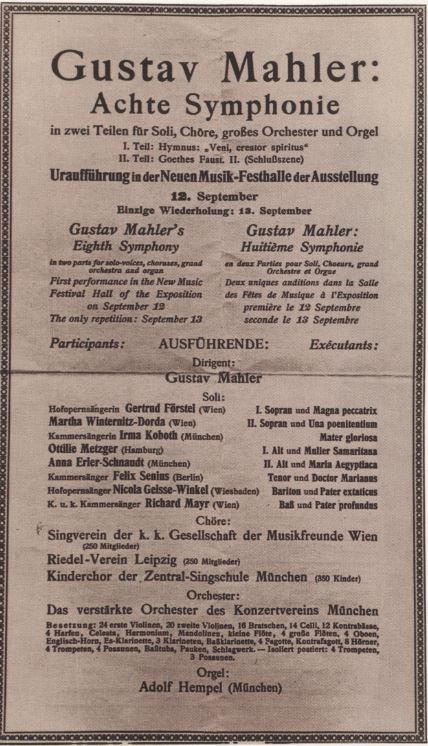
1910 Concert Munich 12-09-1910 – Symphony No. 8 (Premiere). Program.

130. 1910 Concert Munich 12-09-1910 – Symphony No. 8 (Premiere). Mahler in rehearsel.
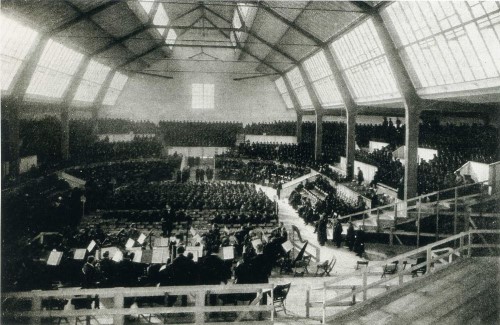
131. 1910 Concert Munich 12-09-1910 – Symphony No. 8 (Premiere). Mahler in rehearsal.
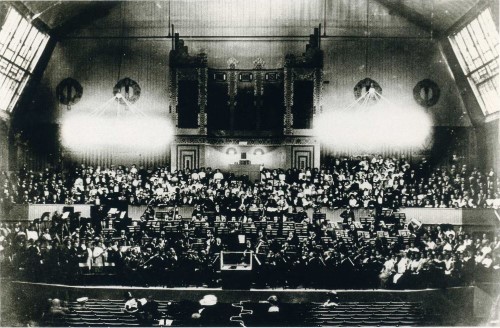
132. 1910 Concert Munich 12-09-1910 – Symphony No. 8 (Premiere). Mahler in rehearsal.
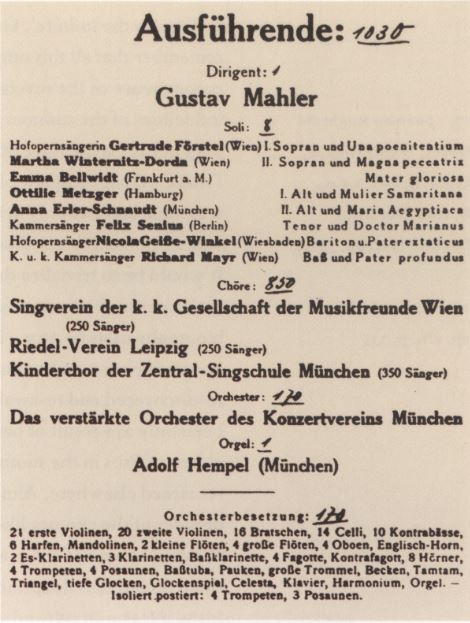
1910 Concert Munich 12-09-1910 – Symphony No. 8 (Premiere). Numbers.
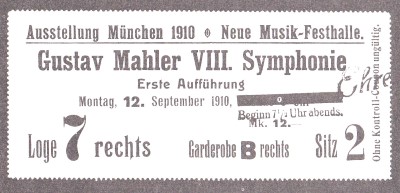
1910 Concert Munich 12-09-1910 – Symphony No. 8 (Premiere). Ticket.
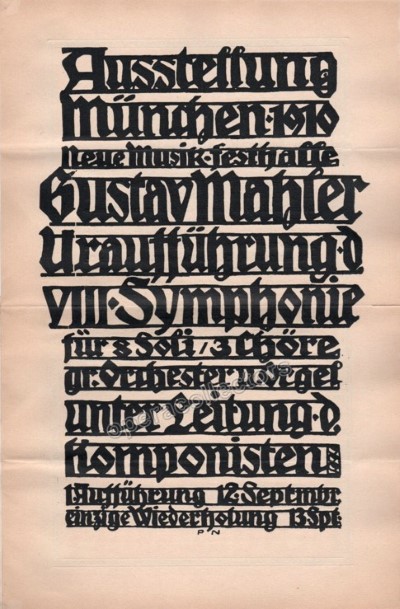
1910 Concert Munich 12-09-1910 – Symphony No. 8 (Premiere). Poster by Alfred Roller (1864-1935).
- 1910 Mahler made arrangements with the impresario Emil Gutmann for the symphony to be premiered in Munich in the autumn of 1910. He soon regretted this involvement, writing of his fears that Gutmann would turn the performance into “a catastrophic Barnum and Bailey show”. Preparations began early in the year, with the selection of choirs from the choral societies of Munich, Leipzig and Vienna. The Munich central-Singschule provided 350 students for the children’s choir. Meanwhile Bruno Walter, Mahler’s assistant at the Vienna Hofoper, was responsible for the recruitment and preparation of the eight soloists. Through the spring and summer these forces prepared in their home towns, before assembling in Munich early in September for three full days of final rehearsals under Mahler. His youthful assistant Otto Klemperer remarked later on the many small changes that Mahler made to the score during rehearsal: “He always wanted more clarity, more sound, more dynamic contrast. At one point during rehearsals he turned to us and said, ‘If, after my death, something doesn’t sound right, then change it. You have not only a right but a duty to do so.'”
- Posters all over Munich.
- For the premiere, fixed for 12 September, Gutmann had hired the newly built Neue Musik-Festhalle, in the Munich International Exhibition grounds near Theresienhöhe (now a branch of the Deutsches Museum). This vast hall had a capacity of 3,200; to assist ticket sales and raise publicity, Gutmann devised the nickname “Symphony of a Thousand”, which has remained the symphony’s popular subtitle despite Mahler’s disapproval. Among the many distinguished figures present at the sold-out premiere were the composers Richard Strauss, Camille Saint-Saëns and Anton Webern; the writer Thomas Mann; and the leading theatre director of the day, Max Reinhardt. Also in the audience was the 28-year-old British conductor Leopold Stokowski, who six years later would lead the first United States performance of the symphony.
- Up to this time, receptions of Mahler’s new symphonies had usually been disappointing. However, the Munich premiere of the Eighth Symphony was an unqualified triumph; as the final chords died away there was a short pause before a huge outbreak of applause which lasted for twenty minutes. Back at his hotel Mahler received a letter from Thomas Mann, which referred to the composer as “the man who, as I believe, expresses the art of our time in its profoundest and most sacred form”.
- The symphony’s duration at its first performance was recorded by the critic-composer Julius Korngold as 85 minutes. This performance was the last time that Mahler conducted a premiere of one of his own works. Eight months after his Munich triumph, he died at the age of 50. His remaining works (Das Lied von der Erde (“The Song of the Earth”), his Ninth Symphony and the unfinished Tenth) were all premiered after his death.
- See description in diary Janko Cadra (1882-1927).
- La Grange draws attention to the notably high tessitura for the sopranos, for soloists and for choral singers. He characterises the alto solos as brief and unremarkable; however, the tenor solo role in Part II is both extensive and demanding, requiring on several occasions to be heard over the choruses. The wide melodic leaps in the Pater Profundus role present particular challenges to the bass soloist.
- Willem Mengelberg (1871-1951) acquired the Dutch (Amsterdam) premiere rights and the rights for Germany (Franfurt) by Universal Edition (UE) music publishers for Symphony No. 8 until 30-04-1912 after the premiere was moved from Amsterdam to Munich.
- Gustav Mahler (1860-1911) told Willem Mengelberg (1871-1951) that both the auditorium and the choir (850 singers) had been far too small and that he had imagined a much larger space. This statement was later confirmed by the composer and pianist Otto Neitzel.
- 03-04-1912 In the Festhalle in Frankfurt were about three times (12.000) as many spectators as during the world premiere (4.000 listeners). The ensemble would also be big enough this time, because Mengelbers orchestras and choirs from Amsterdam and Frankfurt would perform together.
Soloists
- Gertrude Forstel (1880-1950) (soprano): Una poenitentium.
- Martha Winternitz-Dorda (1880-1958) (soprano): Magna Peccatrix.
- Emma Bellwidt (1879-1937) (soprano): Mater Gloriosa (only on 12-09-1910).
- Ottilie Metzger-Lattermann (1878-1943) (alto): Mulier Samaritana.
- Anna Erler-Schnaudt (1878-1963) (alto): Maria Aegyptiaca.
- Felix Senius (1868-1913) (tenor): Doctor Marianus.
- Nicola Geisse-Winkel (1872-1932) (baritone): Pater Ecstaticus.
- Richard Mayr (1877-1935) (bass): Pater Profundus.
Legend audience
- R = Present at one or more rehearsals.
- R5 = Present at rehearsal monday 05-09-1910: Orchestral rehearsals (9.30 to 12 and 4 to 6.30 hours).
- R6 = Present at rehearsal tuesday 06-09-1910: Orchestral rehearsals (9.30 to 12 and 4 to 6.30 hours).
- R7 = Present at rehearsal wednesday 07-09-1910: Orchestral rehearsals (9.30 to 12 and 4 to 6.30 hours).
- R8 = Present at rehearsal thursday 08-09-1910: Soloist and children rehearsals (11 hours).
- R9 = Present at rehearsal friday 09-09-1910: No rehearsals?
- R10 = Present at rehearsal saturday 10-09-1910 Full rehearsal Part I (10 hours) and full rehearsal Part II (4 hours).
- R11 = Present at rehearsal sunday 11-09-1910 Sunday: Final rehearsal (11 hours).
- C12 = Present at concert monday 12-09-1910: 1910 Concert Munich 12-09-1910 – Symphony No. 8 (Premiere) (7.30 hours).
- C13 = Present at concert tuesday 13-09-1910: 1910 Concert Munich 13-09-1910 – Symphony No. 8 (7.30 hours).
Audience family
- Alma Mahler (1879-1964) (R11) in Moll box
- Anna Justine Mahler (Gucki) (1904-1988) (R11) in Moll box
- Gustav Mahler (1860-1911) (R5/R6/R7/R8/R10/R11/C12/C13)
- Carl Julius Rudolf Moll (1861-1945)
- Anna Sofie Moll-Schindler-Bergen (1857-1938)
- Gustav Frank (1859-1923) ?
Audience others
- Adele Marcus (1854-1917) (C12)
- Albert Neisser (1855-1916) and wife (C12)
- Alexander von Zemlinsky (1871-1942) (R11/C12)
- Alfredo Casella (1883-1947) (C12)
- Alfred Roller (1864-1935) (R/C12)
- Alphons Diepenbrock (1862-1921) (R/C12)
- Anna Bahr-von Mildenburg (1872-1947) (with her husband Hermann Bahr (1863-1934) prominently seated in the first row of a box ) (C12)
- Anton Webern (1883-1945) (C12)
- Archduchess Gisela from Austria (1856-1932) (second daughter of Franz Josef I, Emperor (1830-1916)) (C12)
- Arnold Berliner (1862-1942) (C12)
- Arthur Bodanzky (1877-1939) (C12)
- Arthur Schnitzler (1862-1931) (C12)
- Arthur Seidl (1863-1928) (C12)
- Bavarian court members (C12)
- Bernard Herzmansky (1852-1921) (Doblinger music publishers) (C12)
- Bruno Walter (1876-1962) (R/C12)
- Camille Saint-Saens (1835-1921) (C12)
- Carl Lafite (1872-1944) (composer) (C12)
- Countess Greffulhe (patron) (1860-1952) (C12)
- David Josef Bach (1874-1947) (C12)
- Alphons Diepenbrock (1862-1921) (C12)
- Emil Gutmann (1877-1920) (Impresario)
- Emil Hertzka (1869-1932) (C12)
- Emil Ludwig (writer) (1881-1948)
- Erich Wolfgang Korngold (1897-1957) and his father Julius Korngold (1860-1945) (C12)
- Erik Schmedes (1868-1931) (C12)
- Franz Schalk (1863-1931) (C12)
- Freiherr Albert von Speidel (musiktheater Director) (1858-1912) (C12)
- Fritz Redlich (1868-1921) and wife (C12)
- Georges Clemenceau (1841-1929) (C12)
- Gerhart Hauptmann (1868-1946) (C12)
- Grafin Maria Misa von Wydenbruck-Esterhazy (1859-1926) (C12)
- Guido Adler (1855-1941) (C12)
- Gustave Bret (conductor) (1875-1969) (C12)
- Heir to the throne of Spain (who?) (C12)
- Hermann Bahr (1863-1934)
- Hugo von Hofmannsthal (1874-1929) (C12)
- Janko Cadra (1882-1927) (R6/C12) (see his diary)
- Josefine von Winter (1873-1943) (R11 in Moll box/C12)
- Jules Ecorchville (musicologist) (1872-1915) (C12)
- Julius Korngold (1860-1945) and his son Erich Wolfgang Korngold (1897-1957) (C12)
- Julius Stern (1886-1977) (later film producer) (C12)
- Klaus Pringsheim (1883-1972) (C12)
- Koloman Moser (1868-1918) (C12)
- Leon Vallas (musicologist) (1879-1956) (C12)
- Leopold Stokowski (conductor) (1882-1977) (C12)
- Lilli Lehmann (1848-1929) (C12)
- Marcel Montandon (writer, friend of William Ritter (1867-1955)) (R6/C12)
- Marie Gutheil-Schoder (1874-1935) (C12)
- Maurice Baumfeld (1868-1913) (1868-1913) (C12)
- Max Reger (1873-1916) (C12)
- Max Reinhardt (1873-1943) (C12)
- Max von Schillings (1868-1933) (C12)
- Oskar Bie (1864-1938) (C12)
- Oskar Fried (1871-1941) (R/C12)
- Oskar von Hase (1846-1921) (publisher) (C12)
- Otto von Wiener (?) (C12)
- Paul Abraham Dukas (1865-1935) (C12)
- Paul Clemenceau (1857-1946) (C12), and
- Paul Hammerschlag (1860-1933) and his wife (C12)
- Paul Stauber (1876-1918) (C12)
- Paul Stefan (1879-1943) (R/C12)
- Paul de Stoecklin (writer about music) (C12)
- Peter Gast (1854-1918) (close friend Friedrich Nietzsche (1844-1900)) (C12)
- Prinz Ludwig-Ferdinand von Bayern (1859-1949) and his wife (C12)
- Rene Rhene-Baton (composer) (1879-1940) (C12)
- Richard Specht (1870-1932) (R/C12)
- Richard Strauss (1864-1949) (C12)
- Richard von Perger (composer) (1854-1911) (C12)
- Rudolf Krzyzanowski (1859-1911) (C12)
- Selma Kurz (1874-1933) (C12)
- Siegfried Wagner (1869-1930) (Son of Richard Wagner (1813-1883) (C12)
- Sophie Clemenceau-Szeps (1862-1937) (C12)
- Stefan Zweig (1881-1942) (C12)
- Thomas Mann (1875-1955) (C12)
- Willem Mengelberg (1871-1951) (C12 + C13)
- William Ritter (1867-1955) (R6/C12)
- Wilhelm Georg Ritter von Borscht (1857-1943) (politician, mayor of Munich) (C12)
Not present
